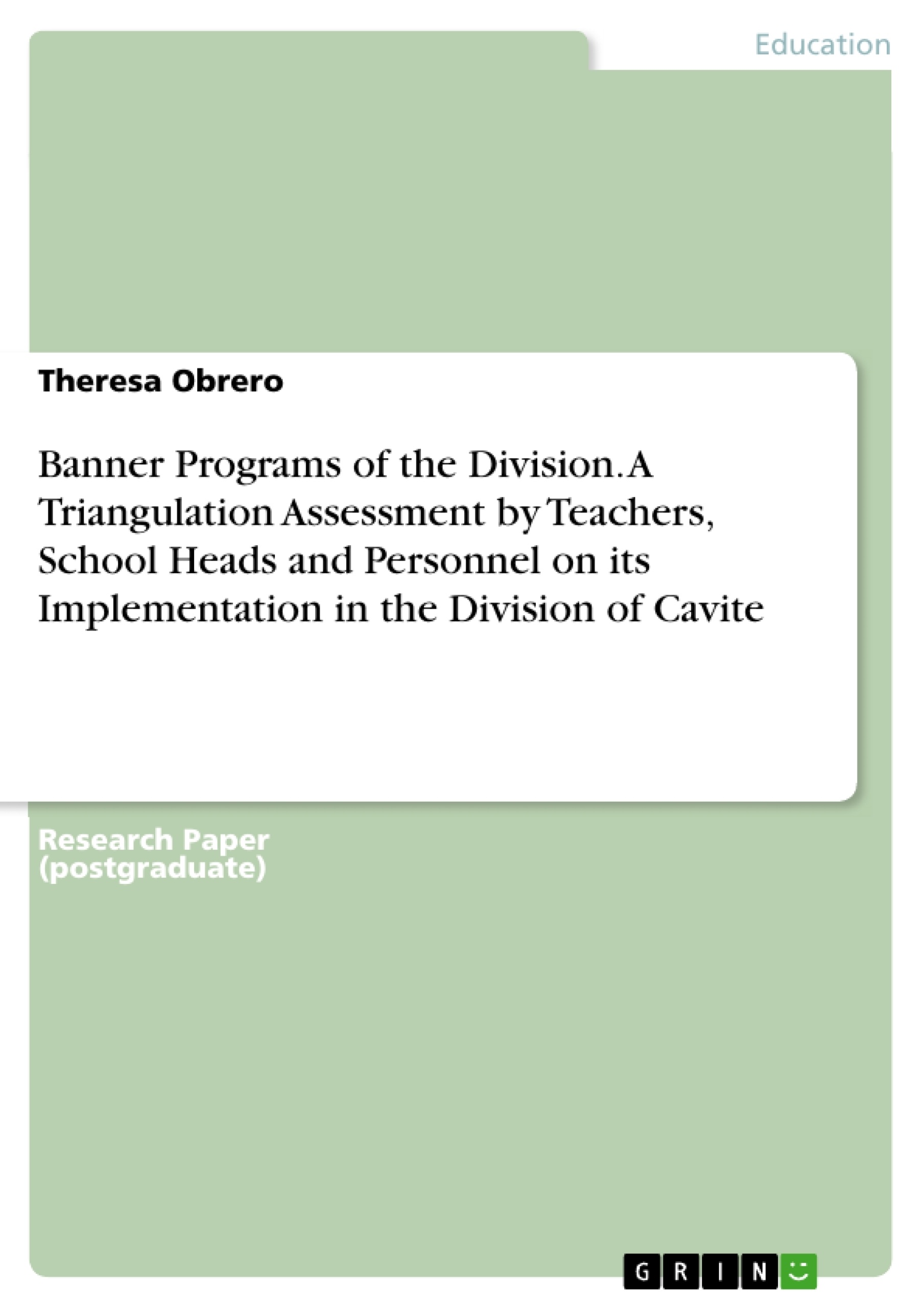The study focused on the deliberateassessment of the Banner Programs of the division aligned to the core thrusts of DepEd classified as Access, Quality, and Governance. This research utilized the descriptive-comparative-quantitative research design. A selected 150 elementary teachers, 35 secondary teachers together with the 37 school heads were identified as participants of the study through random sampling technique.
Frequency and mean percentage score were used to determine the level of implementation of the Banner Programs while ANOVA was used to determine whether there are any statistically significant difference between the assessment of the public school principals, public elementary and secondary teachers, and the division-based personnel reports.
Table of Contents
- I. Introduction
- II. Literature Review
- III. Research Questions
Objectives and Key Themes
The main objective of this study is to assess the implementation of the Banner Programs in the Division of Cavite, using a triangulation approach involving teachers, school heads, and division-based personnel reports. The study aims to determine the level of implementation and identify any significant differences in assessment across these groups.
- Assessment of Banner Programs' Implementation
- Comparative Analysis of Assessments from Different Stakeholders
- Impact of Banner Programs on Access, Quality, and Governance in Education
- Effectiveness of Triangulation Methodology in Program Evaluation
- Contribution to Continuous Improvement in Educational Quality Management
Chapter Summaries
I. Introduction: This chapter introduces the study's context, outlining the mandate of the Schools Division of Cavite under Republic Act No. 9155. It details the division's commitment to quality education and its strategic plan, embodied in the annual tagline and the "ParaSaBatang Kabitenyo" mantra. The chapter then presents the Division Banner Programs, categorized into three goals: Access, Quality, and Governance, and describes the specific projects under each goal. These programs aim to improve access to education, enhance learning outcomes, and improve the efficiency and governance of the division. The introduction sets the stage for the study by highlighting the division's commitment to continuous improvement and the importance of evaluating its key performance indicators.
II. Literature Review: This chapter reviews existing literature relevant to the study, focusing primarily on the theoretical frameworks underlying educational assessment and instructional supervision. It draws upon various sources to contextualize the methods and findings of the study, providing a foundation for understanding the approaches used to evaluate the Banner Programs. The review highlights the importance of formative supervision, highlighting different supervisory approaches and their aims. This section connects the practical aspects of the study with established theoretical principles in educational assessment and program evaluation.
Keywords
Assessment, Banner Programs, Access, Quality, Governance, Educational Assessment, Instructional Supervision, Triangulation, Program Evaluation, Cavite, Philippines, DepEd
Frequently Asked Questions: Comprehensive Language Preview
What is the main objective of this study?
The main objective is to assess the implementation of Banner Programs in the Division of Cavite, Philippines, using a triangulation approach involving teachers, school heads, and division-based personnel reports. The study aims to determine the implementation level and identify significant differences in assessment across these groups.
What are the key themes explored in this study?
Key themes include the assessment of Banner Programs' implementation, a comparative analysis of assessments from different stakeholders, the impact of Banner Programs on access, quality, and governance in education, the effectiveness of the triangulation methodology in program evaluation, and the contribution to continuous improvement in educational quality management.
What are the Banner Programs and how are they categorized?
The Banner Programs are initiatives designed to improve education in the Division of Cavite. They are categorized into three goals: Access, Quality, and Governance. Each goal encompasses specific projects aimed at improving access to education, enhancing learning outcomes, and improving the division's efficiency and governance.
What is the methodology used in this study?
The study employs a triangulation approach, collecting data from teachers, school heads, and division-based personnel to provide a comprehensive assessment of the Banner Programs' implementation. This multifaceted approach enhances the reliability and validity of the findings.
What theoretical frameworks underpin this study?
The study draws upon theoretical frameworks related to educational assessment and instructional supervision. The literature review provides a foundation for understanding the approaches used to evaluate the Banner Programs, connecting the practical aspects of the study with established theoretical principles in educational assessment and program evaluation. Formative supervision and its various approaches are highlighted.
What are the key chapters and their summaries?
Chapter I: Introduction introduces the study's context, the Division of Cavite's mandate, its commitment to quality education, and the Banner Programs. Chapter II: Literature Review reviews relevant literature on educational assessment and instructional supervision, providing a theoretical foundation for the study's methods and findings.
What are the keywords associated with this study?
Keywords include Assessment, Banner Programs, Access, Quality, Governance, Educational Assessment, Instructional Supervision, Triangulation, Program Evaluation, Cavite, Philippines, and DepEd.
What is the overall purpose of this document?
This document serves as a comprehensive language preview, providing an overview of the study's title, table of contents, objectives and key themes, chapter summaries, and keywords. It is intended for academic use and analysis of themes in a structured and professional manner.
- Citation du texte
- Theresa Obrero (Auteur), 2021, Banner Programs of the Division. A Triangulation Assessment by Teachers, School Heads and Personnel on its Implementation in the Division of Cavite, Munich, GRIN Verlag, https://www.grin.com/document/1138576



